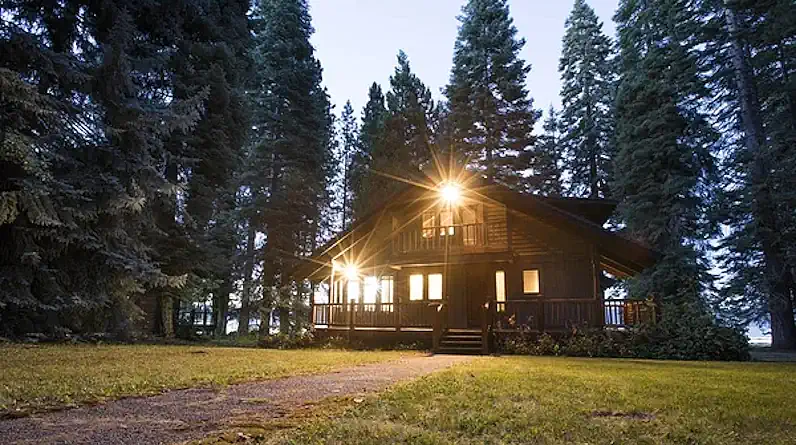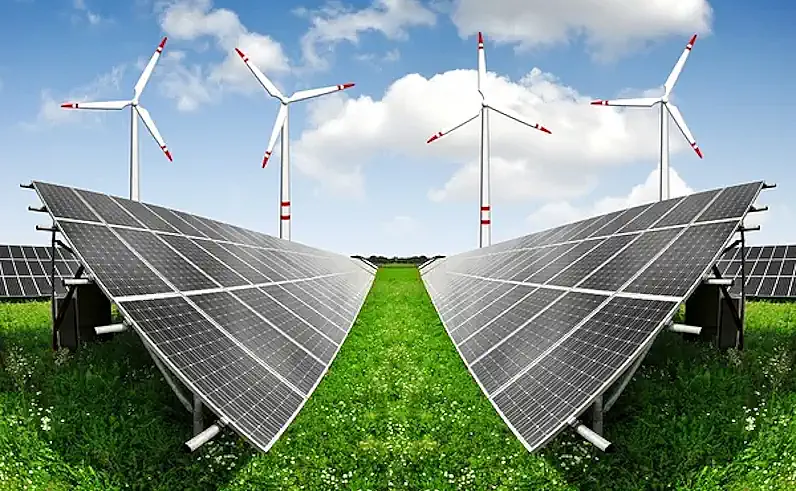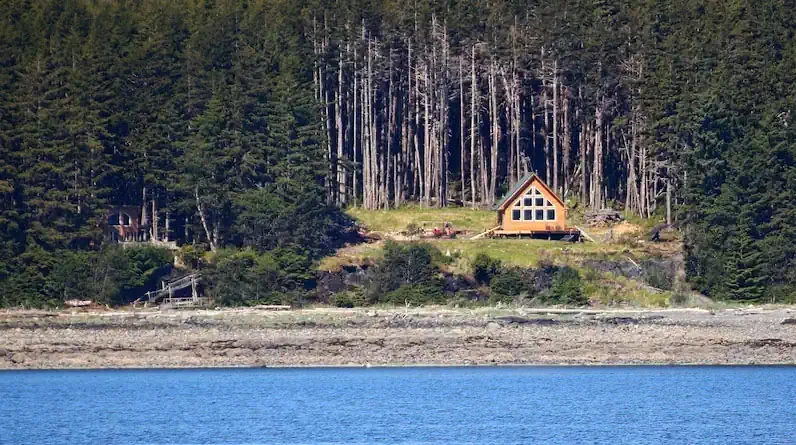
Off-grid living is a lifestyle that involves becoming grid-independent, including being power independent. It focuses on achieving energy autonomy by relying solely on off-grid power sources. This means individuals must generate their own electricity and source alternative solutions to provide heating and cooling, lighting, refrigeration and other basic utilities typically found in the home.
The main benefits of this type of lifestyle include reduced reliance on traditional utility companies, decreased environmental impact due to the use of renewable energy sources such as solar or wind turbines, increased financial savings from eliminating monthly bills, and improved self-sufficiency in terms of providing for one’s own needs.
There are also potential drawbacks to this setup since it requires significant planning, investment and maintenance which can be difficult for some people to manage. Ultimately though, it is possible to enjoy an off-grid lifestyle with careful preparation and dedication.
Alternative Energy Sources
Let’s explore the many alternative energy sources that can help power your off-grid property. Geothermal energy, hydroelectricity, tidal energy, biomass energy and biogas energy are all viable options for powering up a home without using electricity.
- Geothermal energy uses natural heat from beneath the earth’s surface to create steam or hot water used in heating systems and cooling. The process of transferring this heat is usually done through pipes underground that bring the heated liquid from its source into a building.
- Hydroelectricity generates power by capturing moving water such as rivers or streams and converting it into electrical current. This type of renewable resource doesn’t emit any greenhouse gases so does not contribute to global warming.
- Tidal energy harnesses the natural flow of ocean tides; specialized turbines placed underwater convert kinetic motion into electricity which can then be reused.
- Biomass energy produces fuel from organic matter like crops, wood waste, animal manure and other biological material derived from plants which when burned releases stored sunlight into usable heat or power.
- Biogas energy involves extracting combustible gas mixtures, made up mostly of methane, produced during anaerobic digestion of wastes while decaying in landfills or wastewater treatment facilities – these gases are then collected and either utilized directly as fuel or further converted into electricity.
The possibilities for living off-the grid without relying on electricity are immense – and these are resources you can use to make it happen!

Solar Power Solutions
Solar power is a great way to power up your property without relying on electricity. With solar, you can be self-reliant and have an energy source that’s renewable and cost effective in the long run. Here are some of the best solar solutions for living off the grid:
- Solar Panels – Solar panels capture sunlight and convert it into usable electricity which can then be used to power lights, appliances, water pumps and more. They are easy to install and require minimal maintenance over time.
- Solar Batteries – If you want to store excess energy generated by your solar panels, then a battery system could be a good option. These batteries will allow you to store extra energy during times when there’s plenty of sunshine, so that you don’t need to rely solely on direct sunlight during cloudy days or at night-time.
- Solar Inverters – An inverter helps convert DC (direct current) from your solar panel array into AC (alternating current), which is what most household devices use for everyday tasks like powering lights or running TVs and computers.
- Solar Generators – A generator powered by solar energy is ideal if you’re looking for an independent backup power solution should your main supply fail or become unavailable due to weather conditions or other unforeseen events.
- Solar Water Heaters – This type of technology uses solar energy to heat water directly from the sun instead of using traditional electric heating methods such as boiler systems or electrical hot water tanks with no additional fuel required except sunshine!
Overall, these are just some of the many ways in which you can make use of solar power while living off the grid. Investing in any one of these solutions will help bring clean, reliable energy right into your home while saving you money in the process!
Wind Power Solutions
Stepping out of the solar power solutions and into the windy world of renewable energy, one can find many ways to power up their property without electricity. It is almost like a gust of fresh air on an otherwise still day; it brings with it a sense of hope for a brighter future.
Wind energy systems are becoming increasingly popular for residential use as technology advances.
Residential wind turbines offer homeowners an opportunity to generate clean, emission-free electricity from their own backyard. Wind turbine installation requires careful planning and research prior to undertaking any projects in order to ensure that all necessary components are accounted for and installed correctly.
The main components include: towers, blades, motors and inverters. Depending on local regulations and climatic conditions, small or large scale installations may be more suitable for producing enough power to meet your needs.
In addition to providing sustainable energy sources, there are other advantages associated with using wind power solutions such as lower energy costs and reduced carbon footprint.
With proper maintenance, these systems can last up to 20 years or more – making them an investment worth considering if you’re looking for long-term benefits while living off the grid.
To maximize efficiency, consider consulting a professional who specializes in wind energy components before beginning any project related to powering your property without electricity.
Practical Considerations
When living off the grid, it’s important to consider practical considerations. Battery storage is a key factor in powering up your property without electricity. You’ll need to decide how many batteries you’ll need and what type of battery will work best for your needs.
Additionally, energy efficiency measures should be taken into account when planning your off-grid system. This includes using solar panels or wind turbines to generate electricity, as well as efficient lighting systems that require minimal power consumption.
Another consideration is water supply; if main water isn’t available then alternative methods such as rainwater harvesting or boreholes must be used.
Waste management is also an issue as there are no main services to collect waste from the property, so this must be dealt with manually – composting toilets being one popular solution.
Living costs must be taken into account when deciding whether going off-grid is feasible. Installing an effective off-grid power system can cost several thousand dollars initially, but running costs may be reduced over time due to low energy bills and less reliance on utilities companies. Ultimately, these practical considerations should all be weighed up before committing to an off-grid lifestyle.
Frequently Asked Questions
-
What Are The Financial Benefits Of Living Off The Grid?
When it comes to living off the grid, one of the most attractive aspects is that it can provide financial benefits. From energy cost savings to cost efficiency when installing off-grid systems, there are many advantages associated with this lifestyle choice.
Living off-grid usually involves investing in renewable energy sources such as solar and wind power. These investments can pay for themselves over time, thanks to significant financial savings on utility bills. Additionally, utilizing renewable sources like these also helps reduce an individual’s carbon footprint while benefiting from tax credits in some areas depending on local government regulations. This makes going off-grid not just financially smart but environmentally friendly as well.
These days, more and more people are choosing to go off-grid due to its economic and environmental advantages. With a little research and planning, anyone seeking greater control over their energy costs can make the switch to living independently from the electrical grid with great success – both financially and ecologically.
-
How Much Land Do I Need To Live Off The Grid?
As the saying goes, location is everything – and that’s especially true when it comes to living off-grid. How much land you need if you choose to live grid-free varies, depending on your power sources and lifestyle. In order to make an informed decision about off-grid land requirements, there are several factors to consider for a successful transition from life connected to the electric grid.
The ideal amount of land needed for living off-grid depends on what type of power sources you plan to use in place of electricity. For example, solar panels require open space in order to collect enough energy throughout the day; thus, more acreage may be necessary than someone using wind turbines or hydroelectricity instead. Your personal goals also play a role in how much land is required: do you want a large garden? Animals? A barn? These things all take up extra space, so it’s important to factor them into calculations regarding overall area needs.
Beyond having adequate space for alternative power sources and lifestyle considerations, many areas have zoning laws related to off-grid living which should be taken into account as well. Be sure to consult with local government offices before committing yourself to any decisions related to land purchase or rental agreements when considering going grid free. With careful research and planning ahead of time, you can ensure that you secure enough property for safe and comfortable living off the grid!
-
What Is The Maintenance Required For Off-Grid Systems?
Maintaining an off-grid system is essential for living without electricity. It’s important to consider the long-term maintenance of your power sources, such as solar energy. The upkeep of these systems can be divided into 3 parts:
- Regular Maintenance: This includes weekly and monthly tasks to check that all components are working correctly. This may include cleaning them or checking their voltage levels.
- Seasonal Maintenance: During certain times of year, it’s necessary to perform more extensive checks on your system. For example, if you live in a cold climate, winterizing will help protect against damage from freezing temperatures.
- Emergency Maintenance: In rare cases, there might be an issue with one of your components that requires urgent attention. Keeping spare parts on hand and knowing how to troubleshoot any problems can save time and money in the long run.
It’s also recommended that you have regular professional inspections done once a year to make sure everything is operating safely and efficiently. By taking preventative measures and staying ahead of potential issues, you’ll ensure that your off-grid system remains reliable for years to come.
-
Are There Any Government Incentives For Living Off The Grid?
Are there any government incentives for living off the grid? Absolutely! Governments around the world are recognizing and supporting the growing trend of individuals transitioning to an off-grid lifestyle. Depending on where you live, there may be a variety of financial grants or tax credits available to help offset some of the costs associated with installing and maintaining your own individual grid system. Here is a list of potential government incentives that could make it easier for those looking to live off-grid:
- Financial Grants – These grants can provide money directly towards installation costs or other related expenses such as engineering fees or labor costs.
- Tax Incentives – State and local governments often offer tax deductions or credits which can reduce overall costs significantly.
- Subsidized Loans – Low interest loans are sometimes offered by governments to support renewable energy projects including off-grid systems.
- Utility Credits – Some utility companies will offer discounts on electricity bills if customers install their own solar power systems at home.
When considering living off-grid, researching what types of incentives are available in your local area should definitely be part of the plan before making this major life change. Taking advantage of these kinds of opportunities can really help minimize start up costs and make going off-grid more attainable financially in the long run. It’s definitely worth taking some time to research all your options so you can maximize savings from any relevant government programs that might apply to you
-
Are There Any Ready-Made Off-Grid Systems Available?
This is an important question to ask when considering living without electricity. With the increased interest in alternative energy sources, many companies have been developing and producing pre-packaged off-grid systems that are designed for those looking to power their homes or businesses with solar or wind power.
These off-grid systems provide a viable option for people who want to be able to use renewable energy but don’t necessarily have the knowledge of how to install it themselves. These ready-made solutions typically include all the necessary components such as panels, batteries, inverters, charge controllers and other related equipment needed for generating and storing energy from solar or wind power. All one has to do is connect them together in order to start benefiting from this clean source of energy.
When choosing an off-grid system, it’s essential to consider factors such as climate conditions and budget constraints, before making a decision on what type of system would best suit your needs. Research should also be done on reputable suppliers who offer reliable products at competitive prices so you can get the most out of your investment.
With careful planning and due diligence, you can ensure that you obtain a quality product that will help keep your property powered up without relying on traditional electrical grids.
Conclusion
Living off the grid is a great way to reduce your carbon footprint, save money on energy bills and become more self-sufficient. It can be a daunting prospect but with some research, planning and investment you’ll be able to power up your property without electricity.
The financial benefits of living off the grid can be considerable; not just in terms of saving on energy bills, but also from government incentives that are available for those switching to renewable sources of energy like solar or wind power. And there are ready-made off-grid systems available too so you don’t need to start from scratch.
I recently met someone who had made the change to an off-grid lifestyle and they said it was one of the best decisions they ever made! Not only did their monthly costs drop significantly, but it felt empowering knowing that they were no longer reliant on traditional utilities. Plus, using renewable sources of energy meant that they could do their part for the environment – something we all should strive towards if given the opportunity.


